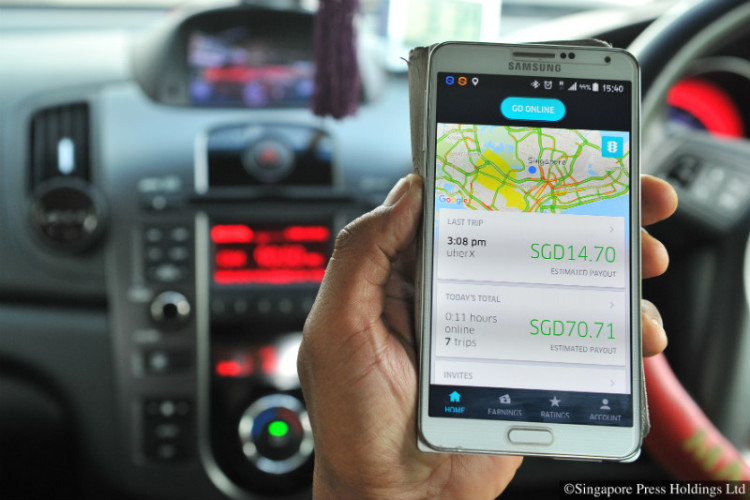
The Uber driver app on a phone. Under new rules, cars used for services such as those provided by Uber and Grab must display decals identifying them as private-hire vehicles.
Private-hire operators such as Uber and Grab will have to ensure their drivers have proper licences and insurance, as well as display a prominent decal identifying the car they drive as a private-hire vehicle, under a law passed in Parliament yesterday.
They can be suspended for up to a month should their drivers be found to have flouted the rules three or more times in a year. They can also be fined up to $10,000 if they do not take steps to ensure their drivers are properly licensed.
But the stiff penalties are a “last resort”, said Second Minister for Transport Ng Chee Meng, adding that the Registrar of Vehicles will not take such a step lightly as “a general suspension order has serious implications” not just for the operator, but also its drivers.
In short, it means the operator will not be able to serve commuters for up to a month as its drivers will be barred from driving for it.
Mr Ng stressed that the intent is to apply it in instances where the “operator repeatedly makes no attempt to ensure that its affiliated drivers adhere to our laws”.
This major move is among several measures introduced in the Road Traffic (Amendment) Bill, which gives the Land Transport Authority (LTA) powers to regulate and take private-hire operators to task, among other things.
The rules were welcomed by MPs, who said these would help level the playing field between private-hire companies and taxi operators. In presenting the Bill for debate, Mr Ng said the measures “are necessary for the interests of commuters”.
The penalties dovetail with new regulations that will be imposed on the private-hire car industry by the first half of this year. Under these regulations, private-hire drivers will be required to undergo a vocational licensing course plus background screening and a medical check.
Cars being used for services such as those provided by Uber and Grab must also be registered with the LTA, and display decals identifying them as private-hire vehicles.
Mr Ang Hin Kee (Ang Mo Kio GRC), who is an adviser to the National Taxi Association, suggested that the Government go further and collect licensing fees from private-hire operators, just like it does with taxi operators.
Cab companies pay a licensing fee of 0.2 percent of the gross revenue collected.
Mr Ang added that the fees collected from the private-hire operators would allow the LTA to recover the costs incurred from monitoring these new players.
But, Mr Ng said, the Government is not planning to license private-hire services for now.
“This light-touch approach allows the industry, which is still evolving, to continue to innovate and benefit commuters,” he added.
Mr Melvin Yong (Tanjong Pagar GRC) asked if the Government plans to expand the new rules to regulate car-pooling services such as GrabHitch.
“A similar vocational licence for ride-share drivers, with mandatory background checks, would serve to enhance the safety of our commuters,” he said.
Mr Ng said that the Government does not intend to do so, as these services differ from private-hire car services in that they are not for profit.
Drivers who carpool can collect only a small fee to help them recover their costs, he added.
The new law includes rules that will govern autonomous vehicles such as driverless cars, and allow the Government to prohibit foreign-registered vehicles from entering and leaving Singapore if they have unpaid fines and taxes.
Related story: Lawyers say tougher to claim against private-hire cars
Related story: Must taxi uncle give way to Uber driver?












